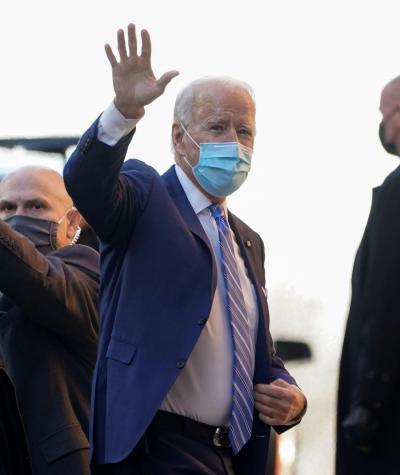President-elect Joe Biden’s 2021 inaugural is expected to be much smaller and cost far less than past transfers of power, so why is Biden’s inaugural committee accepting $1 million in corporate checks?
Past inaugural celebrations have featured days of packed events and galas, but thanks to the global pandemic, Biden’s inaugural events will mostly be livestreamed, with a small number of socially distanced in-person events.
Despite the inauguration’s relatively low expected costs, Biden’s inaugural committee is nonetheless choosing to accept huge donations, including from wealthy special interests seeking to ingratiate themselves with the incoming administration.
Voluntarily adopting moderate inaugural fundraising limits would have signaled a break from the big money influence-peddling of the last administration.
Inaugurations Are Influence-Buying Free-for-Alls
Presidential inaugurations are loosely regulated, and absent self-imposed limits can be influence-buying free-for-alls.
President-elect Trump placed almost no limits on his inaugural fundraising. Private prison companies like GEO Group and CoreCivic each gave $250,000 to Trump’s inaugural, and when Trump took office, his administration reversed its predecessor’s ban on private prisons.
The CEO of Energy Transfer Partners also gave Trump’s 2017 inaugural $250,000, and the Trump administration would go on to green-light Energy Transfer’s Dakota Access Pipeline project.
The U.S. subsidiary of the Venezuelan oil company Citgo also gave $500,000 to Trump’s inaugural, reportedly as part of the Venezuelan government’s efforts to curry favor with the incoming administration.
But the appearance or reality of big inaugural donors getting special treatment is a bipartisan problem and is not a new phenomenon. Regulated interests and government contractors don’t write $1 million inaugural checks so that 3 Doors Down can play the Lincoln Memorial; they do it to buy favor with the new administration.
Even if Biden doesn’t take a transactional approach to the presidency, his inaugural committee accepting six- or seven-figure checks from corporate interests with business before the government will at least raise concerns about improper influence.
Those concerns are largely avoidable, given the unique nature of this year’s inaugural: Biden would appear to have little need for such big checks.
Biden's Inaugural Shouldn’t Cost Much
The actual swearing-in ceremony, where the president-elect recites a 35-word oath pledging to “preserve, protect and defend the Constitution of the United States,” is publicly funded. Millions in federal funds go toward security, maintenance, construction, bleachers, fencing, and cleanup to ensure that the swearing-in ceremony is seamless.
The government of the District of Columbia is additionally expected to spend funds on law enforcement, first responders, transportation, and communication.
A president-elect’s inaugural committee, in contrast, raises private money to fund everything else—which would typically include opening ceremonies, welcome concerts, parades, and private galas and balls around the District.
The pandemic has changed everything. Large indoor gatherings are out of the question for Biden’s inaugural. The Walter E. Washington Convention Center, for example, typically hosts inaugural balls, but is unavailable in January, since it has been converted to a COVID-19 emergency field hospital.
Big outdoor events are likely canceled, too; Biden has said that he may even forego the traditional parade down Pennsylvania Avenue in favor of virtual events.
Certainly, there will be some costs associated with a largely virtual inauguration, but the costs should be far less than those of an in-person inaugural.
As a point of comparison, the host committee for the Democratic Party’s 2016 in-person convention raised over $85 million; for the party’s 2020 virtual convention, the host committee raised less than $43 million.
Biden’s inaugural has a choice about how it meets these relatively moderate costs. Although current law places few limits on inaugural fundraising, past presidents-elect have voluntarily adopted fundraising limits in order to promote public trust in their administration.
During President Obama’s 2009 inauguration, for example, his team capped individual contributions at $50,000 and banned all donations from corporations, PACs, and lobbyists—and still raised $55 million for the five days of festivities. President George W. Bush established a $250,000 contribution cap on both of his inaugurations, raising around $40 million each.
Biden, in contrast, is placing few limits on inaugural fundraising. Biden’s Presidential Inaugural Committee will accept corporate checks up to $1 million, and individual checks up to $500,000.
His committee has pledged to refuse donations from lobbyists and foreign agents, and from the oil and gas industry—but will apparently accept big donations from other regulated interests, like the banking, healthcare, or tech industries.
Biden’s Presidential Inaugural Committee could voluntarily adopt the standard set forth in the For the People Act, H.R. 1, which would limit inaugural donations to $50,000, as well as require an inaugural committee to itemize its spending.
Presidential Inaugural Committee Has a Choice
It can be hard for a candidate to escape fundraising demands during a hotly contested electoral race. The candidate with the most money usually (but not always) wins, so if one candidate is chasing big checks and inviting super PAC support, the other candidate faces pressure to follow suit.
There are no such competitive pressures with a presidential inaugural. The inauguration is the only show in town. It is entirely up to the president-elect’s team about how much to spend, what kinds of events to hold, and how to raise money to finance them.
Inaugurations have important symbolic value. They mark the peaceful transfer of power from one president to the next and allow an incoming president to set the tone for their administration. Indeed, the self-interested influence-peddling that marked Trump’s 2017 inauguration offered a preview of what the next four years would bring.
Given the ethics issues that tarnished the previous administration, and the expected low cost of this inauguration, voluntarily adopting more stringent limits on inaugural fundraising would be a relatively easy way for Biden to mark a sharp contrast with his predecessor.
